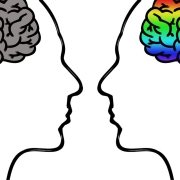What happens when you have a significant difference of opinion with someone you care deeply about? How do you evaluate what is going on? How do you treat each other? What kind of outcome can you expect? 20/20 hindsight gives us a much clearer understanding than what we see in the midst of a heated disagreement.
Here’s what I think is important to consider in dealing with a heated disagreement with someone you deeply care about:
1. You are not seeing the same situation the same way.
- Each person experiences the shared situation through the filter of their own expectations, assumptions, past experiences, beliefs, wounds, and habitual patterns of behavior.
- Given our unique filtering process, we do not see the same situation the same way. While there is a certain objective reality to what has occurred, there are also two distinct perceptions of reality that may be similar or vastly different.
2. Each person has their own habitual ways of reacting.
- It is helpful to observe yourself and the other person to see your respective reaction patterns. Are either of you copping an attitude and harsh judgment of the other? If so, by viewing the situation through that filter you are probably refusing to consider the other person’s point of view. If you are caught in a pattern of judging and rejecting the other person as the cause of your distress, you are likely selectively interpreting what is happening to prove yourself right rather than to reach across the great divide to the other person. Do you judge and reject the other person, or are you open to finding out what the other person is experiencing? Are you willing to discuss what is happening, or do you shut the other person out? Do your feelings get hurt? Do you get angry? Do you keep trying to explain your point of view, even if the other person doesn’t want to hear it or is incapable of hearing it?
3. The way out is not by making one person right and the other one wrong.
- When we blame and judge the other person, we are attempting to be right and justified in holding them responsible for the discord and our upset. This typically results in an inability to even consider what the other person’s experience is and in selectively acknowledging and remembering only those aspects of the situation which support your myopic point of view.
- Believing that you are right might feel good, but it only serves to maintain the divide between you.
- Better than being right is being wise enough to seek understanding of the other person’s point of view in an effort to heal the situation.
4. Behaviors have consequences.
- How people treat each other matters deeply. If we are cruel and judgmental, we seed fear and distrust. If we are kind, we create safe places for us to be together. We are responsible for what we are creating, promoting, and allowing in our relationships and how our behavior impacts others around us as well. For example, parents who engage in a toxic relationship are poor role models for their children. Two friends who have a falling out create tension and drama in their shared community that is often unfair to one or the other.
5. You are responsible for the choices you make. And sometimes when we get hot under the collar, we don’t make very good choices. Nonetheless, we are responsible for our attitudes and behaviors.
I’m currently sorting my way through a disagreement that resulted in a 35-year precious friendship irreparably blowing up. I cannot speak to what the other person involved was experiencing and why she refused to try to heal what was happening. On my final appeal to her to do so, she responded, “Not in this lifetime.” No matter how unreasonable such a response might seem, I recognize that she has a right to make that choice.
Each person has their own way of reacting to a difference of opinion where the outcome is particularly important to them. For example, I first became aware of the problem with my friend when she expressed anger and judgement towards me and blamed her unhappiness on me. I reacted with shock and kept trying to share my very different perspective on what was going on, but she refused to hear it.
When one person refuses to seek healing and reconciliation, the other is forced to move forward without any shared resolution. For me, this is the hardest part – to have no hope and to be left to grieve a friendship I treasured. But life doesn’t always make sense. Our relationship is over, and there is nothing more for me to do about that. But there are life lessons for me to learn here about how I engage with others while remaining true to myself. Here are some of the things I am looking at:
- Did I do my best moving through this situation?
- Was I compassionate about her distress?
- In what ways did I respect or disrespect myself or her?
- What was most difficult for me, and how did I handle that?
- Where could I have done better?
- What do I need to do to support myself in processing what has just happened?
- Am I willing to forgive us both for our inability to create a better outcome?
- What would God have me learn from this to do better in the future?
None of us are perfect. I do believe that we are all doing the best we can, and this is what that looks like. All we can really ask of ourselves is to remain true to ourselves, be kind to each other, and stay open to learning our life lessons as we move through our experiences. Trials and tribulations are a natural part of life, and so it behooves us to build skill in meeting life’s challenges.














